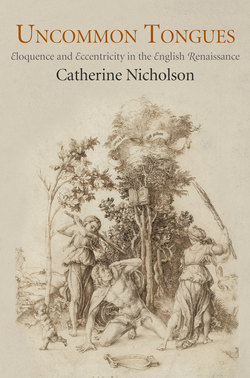Uncommon Tongues

Реклама. ООО «ЛитРес», ИНН: 7719571260.
Оглавление
Catherine Nicholson. Uncommon Tongues
Отрывок из книги
Uncommon Tongues
Eloquence and Eccentricity in the English Renaissance
.....
Like these critics, I am interested in the distorting, even disabling pressure that classical antiquity exerts on the theory and practice of vernacular eloquence—in particular in the impossibility of validating modern native practice without resorting to the definitively ancient and nonnative. But this paradoxical conflation of eloquence and alienation, although it speaks in seemingly direct ways to the belated and marginal predicament of English writers, is by no means particular to the sixteenth century; it is a legacy of the classical tradition’s unresolved attitude toward linguistic difference. In this sense the very incommensurability of the classical past and the vernacular present could prove enabling for English writers, for even as their study of ancient rhetoric and poetry taught them to recognize their estrangement from antiquity, it also taught them to perceive in that estrangement—or any estrangement of language—the essence of literary value. Thus within any number of sixteenth-century English texts, the expressed desire to domesticate eloquence, reconciling antique precepts to the rhetorical imperatives of the here and now, clashes with an equally pervasive tendency to privilege distance and difference as the ideal attributes of eloquent speech. This willful embrace of strangeness is not, as William Harrison assumes, the purview of the unlearned, those self-alienated “other[s]” whose perversity threatens the ideal course of linguistic progress. On the contrary, it is a learned technique, cultivated in deference to the very texts and theories that made English seem so strange.
* * *
.....